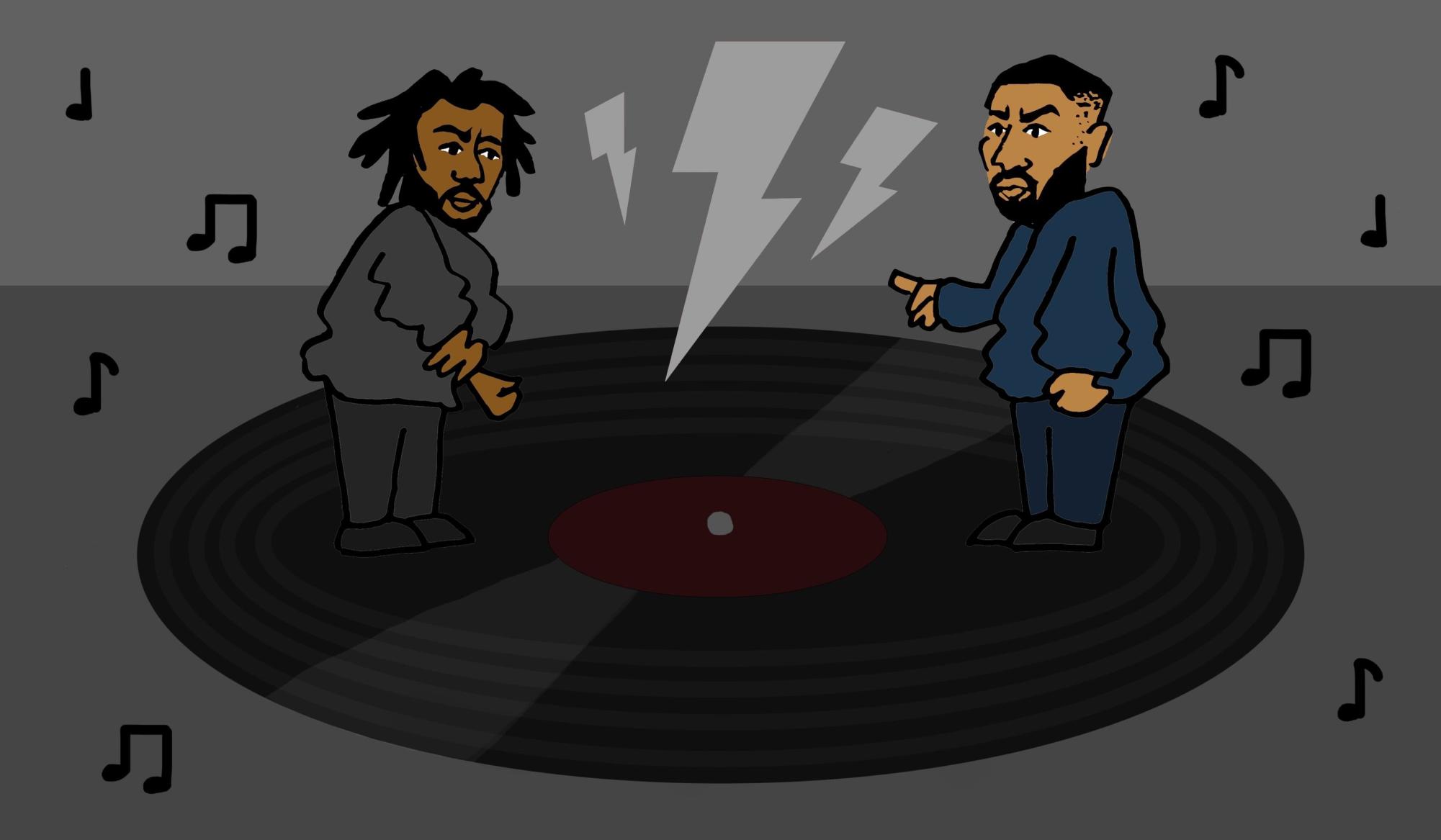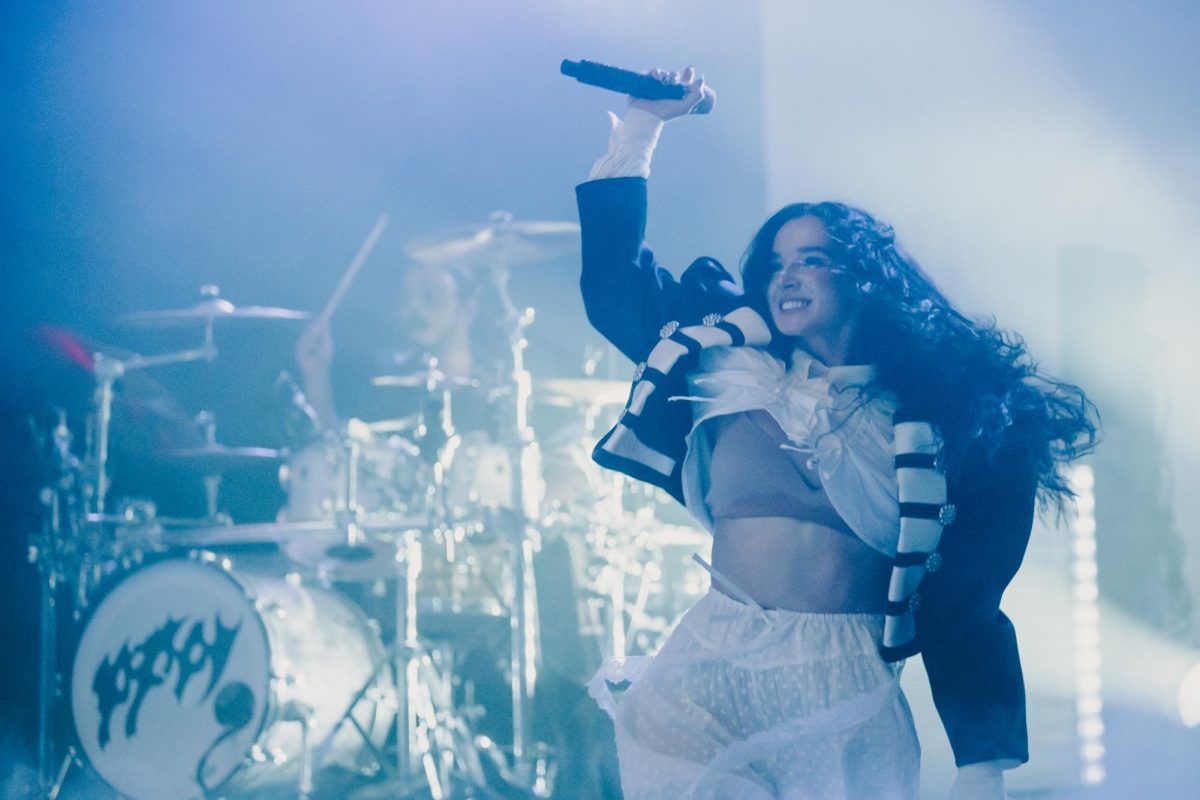From its inception, rap beef and diss tracks have been the cornerstone of hip-hop. It’s the name of the game. Many people in the music industry do not like each other, and that’s okay! The diss record has been ingrained in hip-hop’s DNA, and it’s not going anywhere. Due to artists focusing solely on charts, mainstream hip-hop has turned into a numbers game, and it needs to be rejuvenated.
Beef between rappers is both entertainment for listeners and a healthy way to fuel friendly competition amongst artists and their peers. So, you can imagine how delighted everyone was when Kendrick Lamar decided it was time to stir the pot and make some noise.
On March 26, Future and Metro Boomin dropped their joint album “We Don’t Trust You.” One of the songs on their album, “Like That,” featured Lamar, a surprise feature that swept everyone off their feet. But Lamar’s feature would be the least surprising thing to come out of this song. In his verse, Lamar references rappers “talkin’ out of they necks,” providing the first indicator that he was coming for someone. He goes on to say “motherf[—] the big three / n[—-] it’s just big me,” directly referring to J. Cole and Drake’s song “First Person Shooter” where J. Cole referred to him, Drake, and Lamar as the “big three.” Some people consider these three artists the best rappers in the game right now, due to their lyrical genius, popularity, and — frankly — nostalgia. However, Lamar let it be known that Cole and Drake are not on the same level as him and should stop acting as such.
After “Like That” dropped, the internet went crazy. People were saying Kung-fu Kenny had returned, that Cole was washed up, and that Drake would never recover from this. However, the really interesting part was the rap community’s response to it. Many artists who have previously worked with Drake like Rick Ross, The Weekend, and A$AP Rocky agreed with Lamar. Did the industry suddenly turn their backs on Drake? Or were these feelings simply festering beneath, waiting for a chance to surface?
Despite all the talk about the “big three,” not much heat was put on Cole, but the pressure to respond was overwhelming — so much so that Cole surprised the hip-hop community with an EP called “Might Delete Later.” The EP itself is not solely dedicated to the beef, but the last song “7 Minute Drill” is. In it, he says “I got a phone call, they say that somebody dissing / You want some attention, it come with extensions / He still doing shows but fell off like The Simpsons.”
Both the album and the diss track received mixed feelings, with some saying that he should actually delete it later. Despite the lackluster reviews, people seemed happy he responded. This excitement would soon be diminished when Cole apologized during his set at his Dreamville music festival. He addressed the disses in “7 Minute Drill” by saying, “I know this isn’t what a lot of people wanna hear … I moved in a way that spiritually feels bad on me … that [s—] don’t feel right in my spirit…” On one hand, Cole apologizing to Lamar was a sign of maturity; realizing his mistake and wanting to reconcile with someone he looked up to was admirable. On the other hand, why would he apologize after dropping one song? You don’t apologize in a rap war, you take the hit and move on to the next song. Meanwhile, Lamar had yet to make one comment since the release of “Like That,” letting everyone else run around in a panic like chickens without heads.
You might be thinking, where is Drake in all of this? It wouldn’t be until April 19 that his official response was made with the release of “Push Ups.” In it, he makes silly attempts at clapping back at Lamar by saying “How the f[—-] you big steppin’ with a size-seven men’s on?”, making jokes about Rick Ross’ weight, and telling Metro Boomin to “shut yo ho a[–] up and make some drums.” He even claims this beef has been looming for a while, saying, “And that f[——] song yall got did not start the beef with us / This s[—] been brewin’ in a pot, now I’m heating up.”
Later that same day, Drake released “Taylor Made Freestyle,” where A.I.-generated voices of Tupac and Snoop Dog address Lamar asking him why he is doing this to Drake. While “Push Ups” was a generic and simple Drake song, “Taylor Made” felt lazy and unserious. He even admits it in the song, saying, “The first one really only took me an hour or two.” What felt especially lazy was his unauthorized use of the two artists’ voices. The fact that Snoop Dog is alive and still wouldn’t hop on his track shows Drake has little to no support. The song is no longer available after Tupac’s estate made him take it down due to the A.I. verse.
Shots were now officially fired and the rap civil war had truly begun. Since the release of “Taylor Made,” Kendrick has responded with four more diss tracks. Two of these, “Euphoria” and “6:16 in LA,” discuss Drake’s negligence as a father, his questionable relationships with younger girls, his use of ghostwriters, and his commodification of Black culture. He also alludes to having informants in Drake’s crew OVO that feed him information. Lamar also partnered with producer Jack Antonoff on “6:16 in LA,” the well-known producing partner to Taylor Swift, who Drake has made fun of Lamar for working with. Lamar takes shots at Drake in different ways, making this beef so enjoyable to watch unfold.
Drake then retaliated with “Family Matters,” where he brought up Lamar’s biracial wife and his past hypocrisies. This is Drake’s best diss track yet, switching beats throughout the song, showing he took more time to craft a response. But just when you thought this was it, Lamar released another diss track called “Meet the Grahams” a mere 30 minutes after “Family Matters.” The seven-minute song is addressed to each member of the Grahams including Drake himself, his parents, his son Adonis, and an alleged 11-year-old daughter he’s been hiding. This would mark the second diss track against Drake that exposed him for having a secret kid, the first being Pusha T’s “The Story of Adidon.”
After “Meet the Grahams,” you would think Lamar would wait for Drake to respond, but he wasn’t finished yet. The day after, Lamar released “Not Like Us.” In this song, he doubles down on the pedophilia accusations, even making the cover of the song a map of Drake’s mansion with sex offender identifiers on top. Lamar’s lyricism makes this song so easy to listen to, and to make it even better, he enlisted producer DJ Mustard to accompany this track with a banger West-Coast beat that screams LA. Where Lamar took a serious tone in “Meet the Grahams,” it’s obvious he had more fun with “Not Like Us.”
The latest song to be released in this war is Drake’s “The Heart Part 6” where he claims he fed misinformation to Lamar and defended himself against the pedophile allegations. Drake sounds tired in “The Heart Part 6,” trying to gain ground in speed rather than effort. Drake has been on the defensive and Lamar has him boxed in. Amongst all this drama, external forces keep the fire alive. Metro Boomin put out a free beat for anyone to rap on called “BBL Drizzy,” a shooting at Drake’s home, and the police are now investigating his home after an attempted break-in. This friendly fire has turned into a not-so-friendly fire.
Though there seems to be real hatred for each other now, expressing these feelings through music is the healthiest way to do so, opposed to violence. This is how these beefs are dealt with, and seeing this level of passion from Lamar and Drake is gratifying to see. Drake’s “Family Matters” is the best he’s rapped in a while, and I hope this fuels his music going forward. This is how rap artists are kept on their toes and brings excitement to the rap game again. Mainstream rappers have grown stagnant in this streaming era where a song can blow up on TikTok, making you a star in several months. This rap beef can potentially save hip-hop.
Art by Roxana Anayat








